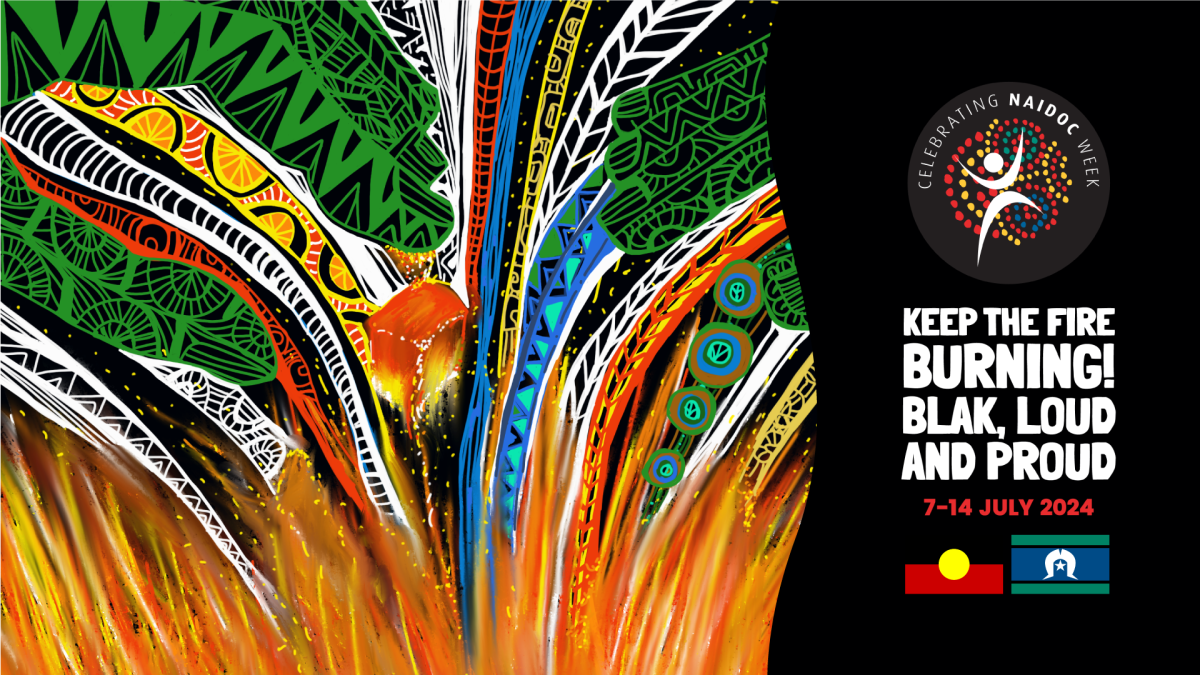Celebrate the world’s oldest continuing cultures this NAIDOC Week
Sunday 7 to Sunday 14 July is NAIDOC Week (‘National Aborigines and Islanders Day Observance Committee’ Week), when communities come together through events, activities and gatherings to celebrate the history, culture and achievements of Aboriginal and Torres Strait Islander peoples.
With a theme of Keep the Fire Burning! Blak, Loud and Proud, NAIDOC Week 2024 emphasises the enduring strength and vitality of First Nations culture, with fire symbolic of connection to Country, to each other, and to the rich tapestry of traditions that define Aboriginal and Torres Strait Islander peoples.
At Deakin, we are:
… committed to Reconciliation and Treaty, advancing the educational aspirations of Aboriginal and Torres Strait Islander Peoples, and moving Indigenous Knowledges into the mainstream of Australian life. All our endeavours aim to reflect Australia’s full history and seek to build an inclusive future.
We pledge to use our position to call out racism, support reconciliation, and work to secure meaningful and sustainable cultural and social change.
The significance of a Welcome to Country
During NAIDOC Week, we’re holding a Welcome to Country ceremony at each campus – we encourage you to attend if you can.
A Welcome to Country ceremony is performed by Traditional Custodians for people visiting their Country. These ceremonies can have varying formats, from speeches of welcome to traditional dance or smoking ceremonies, and can sometimes be accompanied by music.
This important tradition has been practised on this continent for many thousands of years. Crossing into someone else’s Country required permission to enter. When permission was granted, the hosts would welcome the visitors, offering them safe passage and protection of their spiritual being during the journey. Visitors had to respect the protocols and rules of the Traditional Custodians while on their Country.
You may have also heard of an Acknowledgement of Country. This can be performed by anyone and is a way of showing awareness of, and respect for, the Traditional Custodians of the land on which a formal lecture, presentation or event is being held.
How you can get involved
In addition to the Welcome to Country ceremonies, we encourage you to join the other NAIDOC Week events happening both on and off campus.
- Stop by the DUSA Market Day events at Burwood, Waterfront, Waurn Ponds and Warrnambool this NAIDOC Week! We will invite you to personally reflect on what you can do at an individual level: how will you ‘keep the fire burning’ for First Nations people? This is your chance to think about how you can show your support for First Nations people in the local community and beyond. Share your thoughts with us and you could win a prize!
- You can also join a First Nations Artwork Tour at the Burwood Campus, or the opening of The Fire Within art exhibition at Waterfront Campus in Geelong.
- Are you a new international student at Deakin in T2? Learn more about First Nations cultures via our free Friday Friends NAIDOC Week events in Burwood and Geelong!
- Come along and be inspired by the Deakin University Indigenous Oration, ‘Dare to Hope’ by Torres Strait Islander Tanya Hosch at Fed Square, Melbourne.
- Join the NAIDOC Week Webinar with Evolve Communities on Tuesday 9 July, 11am–12pm, which will explore what it means to be an Ally to First Nations people and what are some practical steps that all Australians can take in this space? Come along to be enlightened, inspired and empowered to take action! Register now
Visit our NAIDOC Week webpage for the full list and details of events happening at Deakin and in the community. You can also:
- View our student glossary of Indigenous terms to ensure you’re being culturally appropriate and respectful.
- Visit the NAIDOC Week website for more information and resources.
*Banner image: ‘Urapun Muy’, created by Deb Belyea (Samuawgadhalgal, Torres Strait) won the prestigious 2024 National NAIDOC Week Poster Competition.
The 2024 National NAIDOC Week Poster incorporates the Aboriginal Flag and the Torres Strait Islander Flag (licensed by the Torres Strait Island Council).
